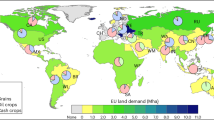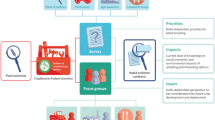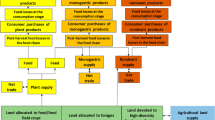Abstract
The European Commission’s Farm to Fork and Biodiversity strategies were widely praised as important steps towards a healthier and more sustainable EU food system. Although this agenda was seen by some as a leap towards increased post-exceptionalism in EU agri-food policy-making, recent political backlash against the Green Deal’s food system ambitions has called into question whether such a post-exceptionalist breakthrough has indeed occurred. Here, we systematically analyse recent shifts in EU agri-food governance across four dimensions of (post-)exceptionalism: ideas, institutions, interests and policies. Despite a diversification of food system sustainability concerns in policy debates, along with some institutional opening and broader consultations with interest groups, we show that policy transformations were very limited—leaving space for emerging political tensions and increasing pressure for deeper post-exceptionalist reform in EU agri-food policies.
This is a preview of subscription content, access via your institution
Access options
Access Nature and 54 other Nature Portfolio journals
Get Nature+, our best-value online-access subscription
$32.99 / 30 days
cancel any time
Subscribe to this journal
Receive 12 digital issues and online access to articles
$119.00 per year
only $9.92 per issue
Buy this article
- Purchase on SpringerLink
- Instant access to the full article PDF.
USD 39.95
Prices may be subject to local taxes which are calculated during checkout
Similar content being viewed by others
References
Schebesta, H. & Candel, J. J. L. Game-changing potential of the EU’s Farm to Fork Strategy. Nat. Food 1, 586–588 (2020).
Roederer-Rynning, C. in Policy-Making in the European Union (eds Wallace, H. et al.) 182–207 (Oxford Univ. Press, 2020).
Transforming Europe’s Food System—Assessing the EU Policy Mix (EEA, 2023); https://www.eea.europa.eu/publications/transforming-europes-food-system
Towards a European Food Policy Council as a New Governance Model in the Future EU Framework on Sustainable Food Systems (EESC, 2023).
Marek, C. & Tosun, J. in Sustainability Transformations, Social Transitions and Environmental Accountabilities (ed. Edmondson, B.) 265–297 (Springer, 2023).
Averyt, W. F. Agropolitics in the European Community: Interest Groups and the Common Agricultural Policy (Praeger, 1977).
Roederer-Rynning, C. in Policy-Making in the European Union (eds. Wallace, H. et al.) 196–219 (Oxford Univ. Press, 2015).
Alons, G. Environmental policy integration in the EU’s common agricultural policy: greening or greenwashing? J. Eur. Public Policy 24, 1604–1622 (2017).
Daugbjerg, C. & Feindt, P. H. Post-exceptionalism in public policy: transforming food and agricultural policy. J. Eur. Public Policy 24, 1565–1584 (2017).
Daugbjerg, C. & Feindt, P. H. in Elgar Encyclopedia of European Union Public Policy 283–291 (Edward Elgar, 2022).
Bazzan, G., Daugbjerg, C. & Tosun, J. Attaining policy integration through the integration of new policy instruments: the case of the Farm to Fork Strategy. Appl. Econ. Perspect. Policy 45, 803–818 (2023).
Molitorisová, A. & Burke, C. Farm to fork strategy: animal welfare, EU trade policy, and public participation. Appl. Econ. Perspect. Policy 45, 881–910 (2023).
Schebesta, H., Bernaz, N. & Macchi, C. The European Union Farm to Fork Strategy: sustainability and responsible business in the food supply chain. Eur. Food Feed Law Rev. 15, 420–427 (2020).
Omar, A. & Thorsøe, M. H. Rebalance power and strengthen farmers’ position in the EU food system? A CDA of the Farm to Fork Strategy. Agric. Hum. Values https://doi.org/10.1007/s10460-023-10508-5 (2023).
Frelih-Larsen, A., Chivers, C.-A., Herb, I., Mills, J. & Reed, M. The role of public consultations in decision-making on future agricultural pesticide use: insights from European Union’s Farm to Fork Strategy public consultation. J. Environ. Plann. Policy Manage. 25, 476–492 (2023).
Grant, W. Is agricultural policy still exceptional? Polit. Quart. 66, 156–169 (1995).
Skogstad, G. Ideas, paradigms and institutions: agricultural exceptionalism in the European Union and the United States. Governance 11, 463–490 (1998).
Halpin, D. in Surviving Global Change? Agricultural Interest Groups in Comparative Perspective 1–28 (Routledge, 2005).
Daugbjerg, C. & Swinbank, A. Ideas, Institutions and Trade: The WTO and the Curious Role of EU Farm Policy in Trade Liberalization (Oxford Univ. Press, 2009).
Sheingate, A., Scatterday, A., Martin, B. & Nachman, K. Post-exceptionalism and corporate interests in US agricultural policy. J. Eur. Public Policy https://doi.org/10.1080/13501763.2017.1334082 (2017).
Skogstad, G. Political parties and policy change in Canadian agricultural marketing institutions. J. Compar. Policy Anal. 23, 561–575 (2021).
Greer, A. & Grant, W. Divergence and continuity after Brexit in agriculture. J. Eur. Public Policy 30, 2326–2348 (2023).
Vitkauskaitė-Ramanauskienė, J. Policy exceptionalism: analysis of ideational framework governing agricultural sector in Lithuania. Viešoji Polit. Admin. 19, 86–101 (2020).
Vik, J. The agricultural policy trilemma: on the wicked nature of agricultural policy making. Land Use Policy 99, 105059 (2020).
Vogeler, C. S. Market-based governance in farm animal welfare—a comparative analysis of public and private policies in Germany and France. Animals 9, 267 (2019).
Zwaan, P., Alons, G. & van Voorst, S. Monitoring and evaluating the CAP: a (post-) exceptionalist policy arrangement? J. Eur. Public Policy 30, 2715–2738 (2022).
Lovec, M., Rac, I. & Erjavec, E. External shocks, policy spillovers, and veto players: (post)exceptionalist common agricultural policy and the case of the 2023-2027 reform. J. Eur. Integr. 46, 433–453 (2024).
Schmidt, V. A. Discursive institutionalism: the explanatory power of ideas and discourse. Annu. Rev. Polit. Sci. 11, 303–326 (2008).
Candel, J. J. L. EU Fails to Deliver on Food System Transformation in Face of Environmental Collapse. ARC2020 (10 October 2023); https://www.arc2020.eu/eu-fails-to-deliver-on-food-system-transformation-in-face-of-environmental-collapse
Becker, S. Supranational entrepreneurship through the administrative backdoor: The Commission, the Green Deal and the CAP 2023–2027. J. Common Market Stud. 62, 688–704 (2024).
Fesenfeld, L. P., Candel, J. & Gaupp, F. Governance principles for accelerating food systems transformation in the European Union. Nat. Food 4, 826–829 (2023).
Mathiesen, K. & Wax, E. Facing farm protests, EU eases demands in 2040 climate proposal. POLITICO (6 February 2024); https://www.politico.eu/article/eu-eases-farming-demands-in-2040-climate-proposal
Finger, R. et al. Farmer Protests in Europe 2023–2024. EuroChoices 23, 59–63 (2024).
Candel, J. J. L. & Biesbroek, R. Policy integration in the EU governance of global food security. Food Sec. 10, 195–209 (2018).
European Commission — meetings with interest representatives. Secretariat-General https://data.europa.eu/data/datasets/european-commission-meetings-with-interest-representatives?locale=en (2024).
Acknowledgements
C.D. received funding for his research from the European Union’s Horizon 2020 research and innovation programme within the OpenInnoTrain project under Marie Sklodowska-Curie grant agreement number 823971. Responsibility for the content of the publication lies entirely with the authors. We thank G. Bazzan for constructive comments that helped us improve the paper.
Author information
Authors and Affiliations
Contributions
J.C. and C.D. both contributed to the conception, design and analysis of the study, as well as to the drafting of the manuscript.
Corresponding author
Ethics declarations
Competing interests
C.D. declares no competing interests. J.C. is a member of Dutch Council on Animal Affairs.
Peer review
Peer review information
Nature Food thanks Gerry Alons, Jostein Vik and Pieter Zwaan for their contribution to the peer review of this work.
Additional information
Publisher’s note Springer Nature remains neutral with regard to jurisdictional claims in published maps and institutional affiliations.
Supplementary information
Supplementary Information
Supplementary Tables 1–3.
Rights and permissions
Springer Nature or its licensor (e.g. a society or other partner) holds exclusive rights to this article under a publishing agreement with the author(s) or other rightsholder(s); author self-archiving of the accepted manuscript version of this article is solely governed by the terms of such publishing agreement and applicable law.
About this article
Cite this article
Candel, J., Daugbjerg, C. EU Green Deal’s food system agenda fails to deliver post-exceptionalist breakthrough. Nat Food 6, 563–570 (2025). https://doi.org/10.1038/s43016-025-01174-3
Received:
Accepted:
Published:
Version of record:
Issue date:
DOI: https://doi.org/10.1038/s43016-025-01174-3
This article is cited by
-
Food securitization and the unmaking of European food policy reform
Nature Food (2025)
-
Co-designing policy mixes to overcome lock-ins towards sustainable agri-food systems: the case of the pig sector transformation in Brandenburg, Germany
Agriculture and Human Values (2025)



